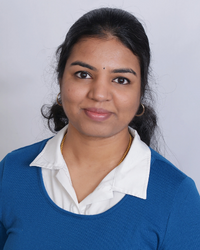
- This event has passed.
Dissertation Proposal - Aparna Srinath
November 29, 2022 @ 9:00 am MST
Event Navigation
 Side-Channel Cryptanalysis of Lightweight Authenticated Encryption With Associated Data (AEAD) Ciphers
Side-Channel Cryptanalysis of Lightweight Authenticated Encryption With Associated Data (AEAD) Ciphers
Presented by Aparna Srinath – Cyber Security Emphasis
Virtual presentation – Join via Zoom
Abstract
Pervasive computing has become a necessity of the current era. Determination of an adequate level of security and providing subsequent mechanisms to achieve it, is one of the most pressing problems regarding embedded computing devices. Side-channel attacks (SCAs) exploit weaknesses in the physical implementation of cryptographic algorithms, and have emerged as a realistic threat to many critical embedded systems.
Accurately evaluating different implementations of the same cryptographic algorithm and comparing different cryptographic algorithms, in terms of their SCA resilience, are challenging issues. Such analysis will provide insights into the system’s parameters that affect its SCA resilience, and in practice will facilitate advances in the design and implementation of real secure cryptographic systems. While there are some solutions for resource-rich computer systems, direct application of these solutions to resource-constrained environments is often unfeasible.
In light of the National Institute of Standards and Technology’s lightweight cryptography (LWC) project, in this dissertation proposal, we provide the first comparative study of SCA resistance on the hardware implementation of two types of LWC substitution-permutation network (SPN) constructions: one that employs the sponge construction and the other that employs S-box-based design. We utilized LWC and CAESAR hardware implementation of these lightweight cryptographic systems and investigated their resistance against Correlation Power Analysis (CPA) attacks in a non-profiled scenario. We also incorporated deep learning techniques into the CPA (DL-CPA) and compared the attack performance of DL-CPA with the conventional correlation power analysis. Our preliminary results show that both types of LWC – SPN constructions exhibit leakage and that DL-SCA can be a more powerful option against side-channel countermeasure implementations than conventional SCAs.
Committee
Dr. Liljana Babinkostova (Chair), Dr. Edoardo Serra, Mr. Robert Erbes, Dr. Kathleen Araújo (GFR)